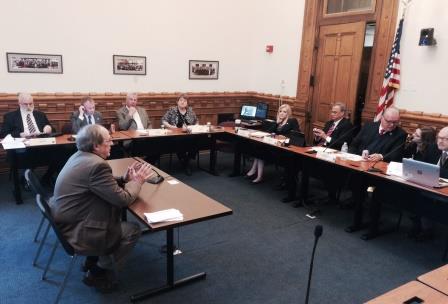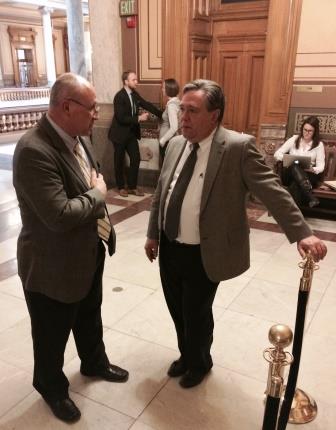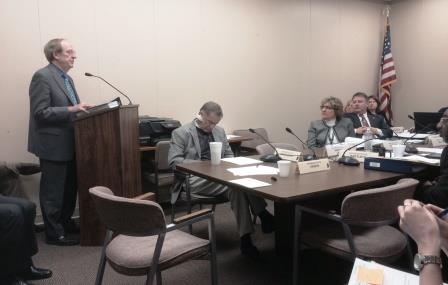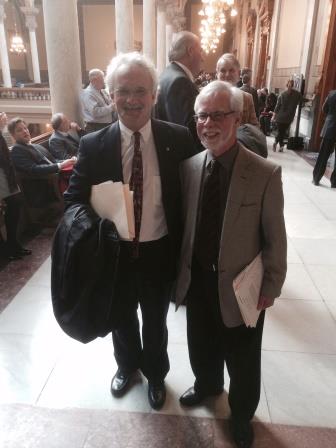|
Message from
AIA Indiana Executive Director Jason Shelley
Please do not hesitate to contact me if I can answer any questions regarding legislative issues.
317/634-6993
_______________________
|
| AIA Indiana Members in Action! 
2015 AIA Indianapolis President Blake Wagner, AIA testifying in committee 
(L-R) Diana Brenner, FAIA and Lt. Governor Sue Ellspermann 
Wayne Schmidt, FAIA testifying in committee 
(L-R) Jason Shelley, AIA Indiana Executive Director and Dan Mader, AIA 
(L-R) Dan Weinheimer, AIA and Rep. Jerry Torr (R - Carmel) 
(L-R) Adam Palmer, AIA and AIA Indiana Executive Director Jason Shelley 
Wayne Schmidt, FAIA testifying in committee 
(L-R) Tony Costello, FAIA and Sen. Tim Lanane (D - Anderson)
 Andy Hine, AIA testifying in committee Andy Hine, AIA testifying in committee  (L-R) Luke Leising, AIA and Rep. Ed Delaney (D - Indianapolis) (L-R) Luke Leising, AIA and Rep. Ed Delaney (D - Indianapolis)  Deb Kunce, FAIA testifying in committee Deb Kunce, FAIA testifying in committee  (L-R) Gov. Mike Pence (R) and Matt Mayol, AIA

(L-R) Sen. Greg Taylor (D - Indianapolis) and Stewart Whitcomb, AIA
 Jim Schellinger, AIA, testifying in committee
Jim Schellinger, AIA, testifying in committee

(L-R) AIA Indiana Executive Director Jason Shelley and Mark Beebe, AIA
|
|
|
__________________________________________________
|
|
|
Bad News, Good News at the Statehouse
March 30, 2015
AIA Indiana has had good news and bad news recently at the Indiana General Assembly. First the bad news, SB 460, nursing home construction moratorium, passed out of the House and its passage into law seems imminent. However, there remains one last opportunity to impact this issue. The good news is HB 1507, state building commissioner qualifications, is stalled in committee and not moving. Nonetheless, HB 1507 is technically still alive and could move again. The legislative session is scheduled to end April 29.
More detailed information regarding the aforementioned bills and other issues are explained below.
HB 1507 - State Building Commissioner Qualifications.
HB 1507, authored by Rep. Heath VanNatter (R - Kokomo), and sponsored by Sen. Carlin Yoder (R-Middlebury), eliminates the requirement the state building commissioner be a licensed architect or engineer. The bill is being pushed by the Indiana Builders Association (IBA - home builders). AIA Indiana is strongly opposed to HB 1507.
The bill was heard in the Senate Commerce and Technology Committee but no vote was taken and the bill has not been rescheduled for a vote. AIA Indiana believes the majority of the committee members agreed with our testimony and position regarding the negative aspects of the bill (see the talking points below) and subsequently, the bill has not moved. Regardless, the IBA is still working very hard to make sure this bill passes into law. AIA Indiana and ACEC (engineers) will continue to oppose their efforts.
Please keep in mind HB 1507 could be scheduled again in the committee for a vote. Therefore, if you have not already done so, please contact your state senator and ask them to oppose HB 1507.
NOTE: Do not contact Sen. Jim Merritt (R-Indianapolis) regarding HB 1507. He is firmly against the bill and has already heard from a lot of his constituents who are architects or engineers. Thank you to the AIA Indiana members who have already contacted Sen. Merritt. Great job!
State Senate - 800/382-9467
HB 1507 TALKING POINTS
*The state building commissioner is much more than just a state plan review staff management position. The commissioner has the authority and responsibility to make state building code interpretations, which have a significant impact on Indiana's built environment and the health, safety and welfare of Hoosiers. AIA Indiana believes the requirements proposed for the state building commissioner in HB 1507 should be the minimum level of requirements for the state plan reviewers who serve under the state building commissioner.
*Architects and engineers design solutions for code compliance and their careers require constant interpretation of the code. A plan reviewer verifies code compliance. A contractor implements someone else's plan for compliance. The state building commissioner is not comparable to other building officials...he or she must "design" interpretation. Those interpretations, in turn, become the code for Indiana. This is a very significant difference. The position is not a plan review position, and is very well suited, and most closely aligned, with the work that architects and engineers do every day.
*If this bill were to pass, the requirements to be a local plan reviewer would be significantly higher than the state building commissioner. Why would the requirements to be the highest code official in the state be less than a local plan reviewer?
*Current language in the bill would theoretically allow an individual with a bachelor's degree in construction management, 10 years' experience as a manager on home building projects, one who never opened a building code book, or had any Class 1 structure experience, be appointed state building commissioner. Appointing a non-architect/engineer as state building commissioner would be akin to appointing a paralegal to oversee all attorneys.
*The state building commissioner's oversight and focus of plan review covers Class 1 structures (i.e. libraries, university buildings and schools, hospitals, hotels, high rise buildings, etc.), not personal family residences (Class 2). 1 & 2 Family Dwellings are not subject to state plan review.
*It is truly reckless for the state of Indiana to lower the level of qualification for its building commissioner, a position that requires the highest level of understanding in the realm of building design and safety. Architects and engineers are specially trained to understand the intricacies of structural design and life safety issues that distinguish them from other professions. If passed, HB 1507 would jeopardize the health, safety, and welfare of Hoosiers who work and visit those buildings every day. When is lowering standards ever a good thing, especially when it could impact the health, safety and welfare of Hoosiers!
*HB 1507 equals bad public policy that will erode building code development and enforcement that has protected the health, safety and welfare of Hoosiers for many years.
SB 460 - Nursing Home Construction Moratorium.
SB 460, authored by Sen. Pat Miller (R - Indianapolis), and sponsored by Rep. Tim Brown (R-Crawfordsville), would ban all nursing home construction in the state for the next three years. Some nursing home operators are supporting a full moratorium on any new nursing bed licenses to limit competition in the market. Under the proposed bill, facilities that construct any nursing homes, including private pay and Medicare, would be restricted from doing so. Passage of this bill would decrease care options and have a negative economic impact on many Hoosier communities.
SB 460 passed out of the House with a 52-40 vote count on March 17. To make matters worse, all efforts to amend the bill before it was passed failed. In its current form, SB 460 contains retroactive language that requires new construction projects to have had construction plans filed with the state by March 1, 2015.
SB 460 may have passed through the House and the Senate but it's not too late for you to act before it becomes law. Since the Representatives in the House amended the Senate version of SB 460, the bill now goes back to the Senate for approval before heading to the governor's desk. If the Senate passes the retroactive House version of SB 460, it will head directly to the governor's desk. Once the governor receives the bill, he can sign it, veto it, or do nothing. Once the governor receives SB 460, the only way it does not become law is if he actively vetoes it. We need the governor to take an active stance against SB 460 and veto the bill when it reaches his desk.
Please contact the governor directly through the Indiana Alliance for Quality Senior Living website
here (AIA Indiana is a member of the alliance). This may be the final opportunity to defeat SB 460.
SB 460 TALKING POINTS
*Senate Bill 460 puts into place a building moratorium on comprehensive care health facilities through June 30, 2018. The bill does allow for a few exemptions but it would cease the modernization of the long-term care industry in Indiana.
*The oldest facility in Indiana is 68 years old (licensed in 1947). There were 15 facilities built in the 50's, 123 built in the 60's, and 130 built in the 70's; in fact, 239 facilities are more than 40 years old. It is time to force Indiana's long-term care industry to modernize. At the current average rate of 7 new facilities per year since 2009, it would take 76.14 years to replace existing outdated facilities. (2015 data from the Indiana State Department of Health)
*New facilities designed by the Hoosier AIA members are committed to the State's goal of encouraging home healthcare with a focus on rehab and getting people home. An average patient's Medicare stay in a modern facility is approximately 20 days.
*The moratorium contained in SB460 creates winners and losers among long-term care providers, with consumers coming in last. The only entities that will benefit from the moratorium are old facilities that no one wants to go to.
*A nursing home construction moratorium damages Indiana and harmfully restricts senior options.
*Some nursing home operators (not all) are fighting for a full moratorium on any new nursing facility licenses to limit competition in the market.
*Companies that develop, build, and operate new nursing homes with private pay and Medicare (not state-funded beds) would be restricted from doing so under this bill, creating a negative impact on communities and jobs in Indiana, and limiting senior choices.
*Competition creates better quality care, improvements in the physical building, and, potentially, lower cost of care.
*The senior health care industry is poised to provide thousands and thousands of jobs in Indiana, both construction and permanent good-paying jobs, including nursing, administration, occupational therapy, maintenance and chefs, and have a significant economic impact to local communities.
*Indiana cities and towns should decide whether a project is good for their community. The bill would prohibit those communities from determining if a new property project would be a good economic development opportunity.
*Existing properties are older and institutional. Most are out of date and not what the current and upcoming senior market desires. The newer properties are designed to satisfy the needs and desires of seniors, with amenities such as private rooms, private baths and ample social activities. The innovation currently being demanded cannot occur if a moratorium passes.
HB 1300 - Ordinances Related to Building and Housing Laws.
HB 1300, authored by Rep. Jud McMillin (R-Brookville) and sponsored by Sen. Philip Boots (R-Crawfordsville), specifies that an ordinance or other regulation adopted by a political subdivision that qualifies as a fire safety law or a building law: (1) must be submitted to the fire prevention and building safety commission (commission) for review within 30 days of adoption by the political subdivision; and (2) is not effective until it is approved by the commission. AIA Indiana supports this bill.
Last week during the bill's hearing in the Senate Local Government Committee an amendment was proposed by the Indiana Association of Cities and Towns (IACT) calling for a time limit on the commission to disapprove local building ordinances to prevent them from automatically becoming approved. As initially presented this amendment would have been a complete subversion of the intent of HB 1300 and would have had the effect of unraveling the statewide building code. Instead of the commission being in a position of having to approve a local building ordinance before it takes effect, the commission would have had to be constantly on the defensive to prevent conflicting codes throughout the state from automatically going into effect. A uniform statewide building code encourages economic development by making it easier for owners, designers and builders throughout the state to play by the same set of rules, creating safer buildings due to the uniform rules being administered at the state level where local "good-old boy" tactics do not apply.
During the committee hearing AIA Indiana was able to work with IACT and the Indiana Department of Homeland Security to find a compromise on HB 1300. The compromise will basically allow the commission at least six months to consider and rule on local building ordinances. If the commission does not act within that time frame, the ordinance will automatically be approved. The proposed compromise amendment will be offered during the second reading amendment process on the Senate floor. The proposed second reading amendment is being prepared and AIA Indiana will have time review it before it is offered.
CLICK HERE to view the full list of bills being followed by AIA Indiana. Your comments and input are welcome regarding any of the bills listed.
Do not hesitate to contact AIA Indiana Executive Director Jason Shelley, [email protected]
, 317-634-6993, if you have questions or concerns regarding these or any other issues.
|
|
________________________________________________
|
|
Use your clout to support your profession by attending an "AIA Indiana Day at the Statehouse." This is a unique opportunity to learn firsthand about the key AIA state legislative and regulatory issues and become a lobbyist for a day. You will be able to directly impact the legislative process by meeting with your state legislators and discussing the issues important to architects. Current dates available are: April 2, 6, 13, 14, and 15. Please choose a date and RSVP to AIA Indiana Executive Director Jason Shelley, [email protected], 317/634-6993. The day will begin at 12 p.m. with lunch and end no later than 3 p.m. A unified voice is vital. Don't wait to get involved!
|
|
_________________________________________________
|
|
 (Far Upper Right) Rep. Ed. Clere (R-New Albany) speaking to AIA Southern Indiana Chapter members at Kovert Hawkins Architects' office in Jeffersonville, IN. Lobbying Basics for Communicating with Your Local Legislators *Please contact your state senator and state representative and introduce yourself, if you don't already know them. Invite them to tour your firm. Discuss with them the issues that are important to you and your firm. I am sure they will appreciate hearing from you. To contact your legislators, see the information below. House of Representatives - 800/382-9842 State Senate - 800/382-9467 Email - http://iga.in.gov/legislative/2015/legislators/
*Take a personal inventory of how you know legislators with whom you have a personal relationship (political or civic activities, church, business relationships, etc.)
*If you are having an open house, or important press release or ribbon cutting event, add your local legislators to the mailing list.
*Ask legislators and other elected officials to attend local AIA chapter meetings.
*Invite your local legislators to visit your firm.
*Invite your local legislator to lunch or coffee.
Do not hesitate to contact AIA Indiana Executive Director Jason Shelley, 317/634-6993 or
[email protected], if you have any questions.
|
| __________________________________________________ |
|
Please
contribute to the Architects for Indiana Political Action Committee (ARCHPAC). The importance of our participation in the political process becomes evident each time we must take action to cope with legislative proposals that call for extending the sales tax to services, requiring stock school plans, or providing interior designers stamping privileges!
Please join many of your fellow Hoosier AIA members who have already contributed and write a $50 check today to ARCHPAC and return it to AIA Indiana, 115 W. Washington St., Suite 955 S, Indianapolis, IN 46204.
|
|
__________________________________________________
|
|
_________________________________________________
|
|
| |
|